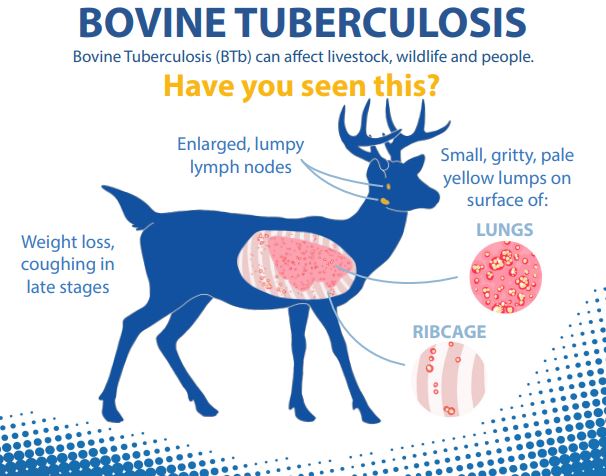Bovine Tuberculosis (BTb)
Bovine Tuberculosis (BTb) is a contagious disease caused by the bacteria Mycobacterium bovis (M. bovis).
On this page:
About BTb
BTb is a long lasting and debilitating disease that can infect several mammals. In Canada, cases of BTb have been found in:
- Bison
- Moose
- Deer
- Elk
- Cattle
BTb can be transmitted by:
- Close contact between animals
- Sharing feed and water
BTb and humans
Effects of BTb
Bovine Tuberculosis can have significant impacts on agricultural economies, wildlife management and public health. Outbreak management of cases in livestock is led by the Canadian Food Inspection Agency (CFIA). Wildlife agencies are required to confirm the disease status of wildlife in areas where BTb is identified in livestock. To date, BTb has not been detected in B.C. wildlife.
Signs and symptoms of BTb
When hunting, take the time to observe and only harvest healthy appearing animals. Always examine the lungs and rib cage of the animals you harvest.
Advanced stages may show multiple small gritty lumps in the:
- Lymph nodes
- Lungs
- On the inner surface of the rib cage
If you see an animal displaying signs of BTb, please:
- Take a photograph
- Save a sample
- Report your observations
If you think you may have been exposed to BTb, contact your local medical professional.
Safe field dressing
A BTb-infected animal may appear healthy in the early stages of the disease. Review the safe game meat handing document (PDF, 154KB) for best practices to keep your meat safe.
Rigorous food safety measures are recommended while handling meat from harvested animals. After field dressing and butchering make sure to use warm soapy water and/or a 10% bleach solution to wash:
- Your hands (alternatively, wear gloves)
- Knives
- Cloths
Signs of BTb
Learn more
Contact information
For wildlife-human interactions where public safety may be at risk call the Report All Poachers and Polluters (RAPP) line:
For wildlife health inquiries or reports:
250 751-3219
Cait.Nelson@gov.bc.ca

